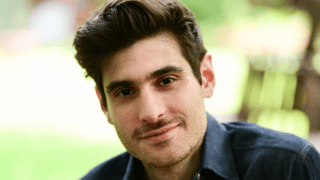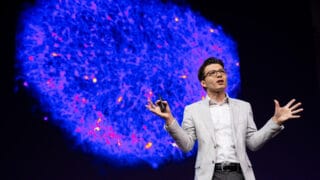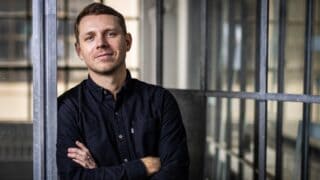The Lavin Agency Speakers Bureau
A speakers bureau that represents the best original thinkers,
writers, and doers for speaking engagements.
A speakers bureau that represents the best original thinkers,
writers, and doers for speaking engagements.
Making STEM fields inclusive is about maximizing human creativity and building a better world.
At the MIT Media Lab, David Kong is a passionate, brilliant exponent of biotechnology: the next major scientific innovation to transform life as we know it. But to start the revolution—and for human creativity to flourish—we need STEM to be inclusive: fusing tech with art, granting all people access to advanced science, and re-visioning what labs, classrooms, and companies look like.
As Director of MIT Media Lab’s new Community Biotechnology Initiative, David Kong empowers inclusive communities through biotech (the process by which living systems—DNA, tissue, plants—are adapted for new and useful technologies). And this means asking broad, vital questions. How do we design a future in which biotech, and science in general, is accessible to everyone? How do we demolish artificial divisions between culture and engineering, science and art? And how can we involve underrepresented people in cutting-edge STEM fields?
Biotech is arguably the major science of the 21st century. But to expedite its arrival, Kong argues, we need new models of knowledge production—groups from a wide range of backgrounds doing vital work away from traditional labs—much like the homebrew computing groups that gave way to Apple. It’s all about getting communities engaged now, while the tech is still being shaped. But that also means the movement hinges on accessibility: of tools, spaces, and infrastructure. So Kong champions grassroots labs away from college, federal, and corporate structures, designed specifically to be available, and appealing, to people who might never encounter biotechnology. He’s the co-founder and managing faculty of “How to Grow (Almost) Anything,” an MIT course on synthetic biology (read: a means of applying engineering frameworks to living systems to make them easier to design) that reaches labs in places like Switzerland, Latin America, and Japan, yet still demonstrates how to perform fruitful genomic experiments.
It’s also why he works to ‘culture hack’ biotech’s limited public perception, and connect the discipline with cultural languages—like hip-hop. His ‘Biota Beats’ project uses a microbial record player to translate microbes from the human body into music (he’s even sampled DJ Jazzy Jeff’s unique makeup). As a DJ, beat-boxer, vocalist, and rapper, he’s performed at South by Southwest, the Staples Center in Los Angeles, and Brooklyn Bowl, opening for hip-hop legend Questlove. He is also an an award-winning vocal arranger and producer, so naturally, Kong was the official DJ of the Global Summit on Community Biotechnology, where he performed a composition called “Uni-Verse,” designed from bacteria sampled from 3,000 students (a vision of the shared global community, via microbes!).
Outside the lab, he’s worked as a community organizer for more than a decade. As the founder of EMW—an art, technology, and community space in Cambridge, MA—he champions the transformative power of artistic expression and arts-based programming with values rooted in social justice. Serving marginalized communities—from LGBTQ to Asian-, African-, and Muslim-American—he explores and uplifts through forms like poetry, electronic music, beatboxing, and (yes!) bio-hacking, involving community labs and dissolved silos between science and art. But while he was founding this group he was also working with the Department of Homeland Security and FBI as part of MIT’s Lincoln Laboratory—moving from DARPA projects during the day to social justice organizing with Black Lives Matter at night. While he collaborates with Harvard Business School and MIT Sloan, he’s also an artist—his photography has been exhibited at the Smithsonian in Washington, D.C.—and his exhibit, I Want the Wide American Earth: An Asian Pacific American Story, can be seen at the National Museum of American History.
Kong has sterling institutional chops. He’s on the forefront of biotech, microfluidics, and “lab on a chip” technologies, which miniaturize large-scale processes into tiny, user-friendly interfaces. He’s forged artificial guts, created 3D-printed DNA assemblers, and worked to destroy cancer cells through miRNA-based genetic circuits. He’s a LEAP fellow and has served as guest faculty at the Marine Biology Lab in Woods Hole, MA. He was a founder of the synthetic biology team at MIT, and a founder of Metafluidics, an open repository for fluidic systems. And he earned his M.S. for developing technology for printing nanostructures with energetic beams, and his Ph.D. for demonstrating the first gene synthesis in a microfluidic system (both from the MIT Media Lab).
David did a phenomenal job! He was very well received by the group and eloquently articulated the connectivity with being inclusive and the power of change and transformational leadership. We truly look forward to working with David again in the future!
Kone
Author, A Brief History of Intelligence AI Entrepreneur and Founder of Bluecore Forbes 30 Under 30 Honoree

New York Times Visionary in Medicine and Science Founding Director of Stanford Brain Organogenesis Knight of the Order of Merit
CEO of Phylagen, Inc. TED Senior Fellow

Founder and Director, MIT Self-Assembly Lab Associate Professor of Design Research, MIT
CEO of Phylagen, Inc. TED Senior Fellow
Microsoft VP Engineering, CoreAI Computational Design & Research Author of How to Speak Machine

Author, How to Make Your Brain Your Best Friend Neuroscientist with 2 Million Followers Across Social Media Platforms

Founder and Director, MIT Self-Assembly Lab Associate Professor of Design Research, MIT

Author, A Brief History of Intelligence AI Entrepreneur and Founder of Bluecore Forbes 30 Under 30 Honoree

#1 New York Times Bestselling Author of Grit and Situated | Pioneering Researcher on Grit, Perseverance, and the Science of Success

Nobel Prize Winner | 3rd Most Cited Economist in the World | Bestselling Co-Author of Why Nations Fail and Power and Progress

Harvard Business School Behavioral Science Professor | "40 Under 40 MBA Professor" | Author of TALK: The Science of Conversation and the Art of Being Ourselves

#1 New York Times Bestselling Co-Author of Abundance | Host of thePlain English Podcast | Founder of the Substack Derek Thompson

#1 New York Times Bestselling Author of How the Word Is Passed and Above Ground | The Atlantic Staff Writer